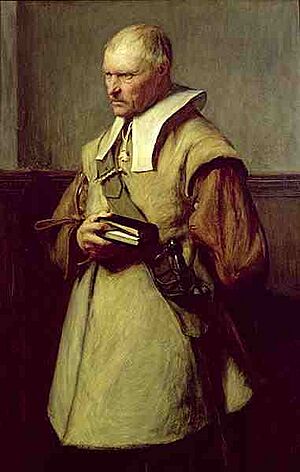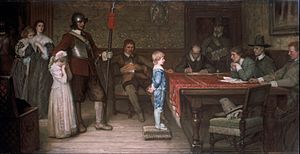Roundhead facts for kids
Roundheads were the people who supported the Parliament of England during the English Civil War (1642–1651). They were also called Parliamentarians. They fought against King Charles I of England and his supporters, who were known as Cavaliers or Royalists. The Royalists believed the king should have total power, a system called absolute monarchy, and that his right to rule came from God (the divine right of kings). The Roundheads wanted Parliament to have the main control over how the country was run.
What Roundheads Believed In
Most Roundheads wanted a constitutional monarchy. This means a king or queen would still rule, but their power would be limited by laws and Parliament. This was different from King Charles I's idea of an absolute monarchy, where the king had all the power.
After the English Civil War ended in 1649, many people were unhappy with the king. This allowed leaders like Oliver Cromwell to remove the monarchy completely. They then created a new government called the Commonwealth of England, which was a republic without a king.
Some important Roundhead leaders, like Thomas Fairfax and Edward Montagu, 2nd Earl of Manchester, still wanted a constitutional monarchy. However, Oliver Cromwell and his more radical followers, who had the strong support of the New Model Army, gained more power. They used the idea that King Charles had betrayed England by working with the Scots against Parliament.
Many Puritans and Presbyterians in England were strong supporters of the Roundheads. Smaller religious groups, like the Independents, also joined them. However, it's important to know that many Roundheads were also members of the Church of England, just like some Cavaliers.
Within the Roundhead movement, there were different groups with their own ideas. These included the Diggers, who wanted to share land, and the Levellers, who pushed for more equal rights for everyone. There were also the Fifth Monarchists, a religious group who believed Jesus would soon return to rule the world.
Why They Were Called Roundheads
Some Puritans, but not all, wore their hair cut very short around their heads. This was a clear difference from the fashionable men at court, who wore long, curly hair. Because of their short hair, people started calling them "Roundheads" as a way to make fun of them.
During the war and for some time after, "Roundhead" was an insult. In the New Model Army, soldiers could even be punished for calling a fellow soldier a Roundhead. This was different from the term "Cavalier," which was used for the king's supporters. "Cavalier" also started as an insult, comparing them to Spanish soldiers who had treated Dutch Protestants badly. But later, the Royalists proudly used the name "Cavalier" for themselves.
The name "Roundhead" likely first appeared as an insult in late 1641. At that time, there were many debates in Parliament, which led to protests in Westminster. People described the crowds there as having "the hair of their heads very few of them longer than their ears." So, the protesters, who included London apprentices (who often had short hair due to their rules), were nicknamed "Roundheads."
Some historians say the word was first used on December 27, 1641, during a protest. Another story suggests Queen Henrietta Maria of France, King Charles I's wife, first used the term earlier that year. She supposedly asked who the "roundheaded man" was, referring to John Pym, a leading Member of Parliament.
Edward Hyde, 1st Earl of Clarendon, a key advisor to Charles II of England, noted that "Roundhead" and "Cavalier" became common terms. Those who supported the king were called "Cavaliers," while the others were looked down upon as the "rabble" and called "Roundheads."
Interestingly, after the Anglican Archbishop William Laud made a rule in 1636 that all clergy should wear short hair, many Puritans grew their hair longer to show they disagreed with him. Even with longer hair, they were still known as Roundheads. Later, some "Independent" Puritans even used "Roundhead" as an insult for "Presbyterian" Puritans, who still preferred short hair.
The term "Roundhead" was used to describe people who wanted a republic until the 1670s. Then, it was replaced by the term "Whig," which also started as an insult. Similarly, "Cavalier" was replaced by "Tory," another term that began as a negative nickname.
Images for kids
See also
 In Spanish: Roundhead para niños
In Spanish: Roundhead para niños




